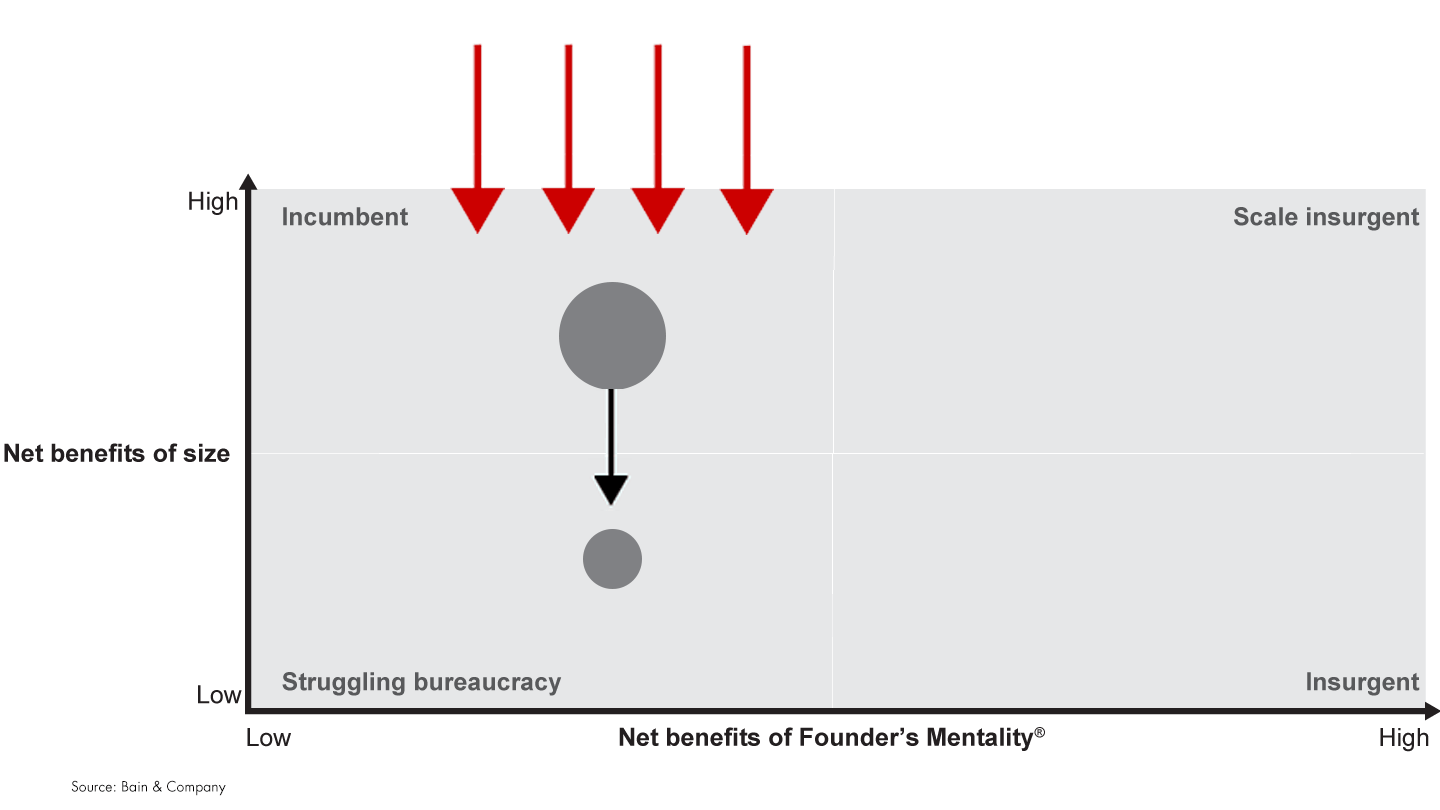Founder's Mentality Blog
The power of incumbency can be formidable for a company that remains focused on its core mission. But just as insurgent companies encounter a predictable set of forces that erodes the Founder's Mentality® as they grow, large multinationals struggle against forces that threaten to turn the power of incumbency into the pain of bureaucracy. We refer to these forces as the southward winds.


Complexity is a fact of life for modern global corporations. And for those that manage it effectively, it can actually be a competitive advantage. Consumer goods companies that can efficiently serve the complex needs of multinational retailers, for instance, gain a crucial edge on those that can't.
But too often, unchecked complexity is the silent killer of growth. Expanding into new businesses and markets creates dense portfolios and the continuous need for reorganization. That leads to new layers of management and processes to enhance the flow of information, which inevitably generates more complexity not less. Before long, too many management voices are communicating their own versions of strategy and operating plans throughout the corporation. Attempts to manage the resulting dissonance lead to more layers of complexity and pretty soon a good day at the office means creating alignment rather than figuring out how to beat the competition or better serve customers. The growing inward focus slowly dulls competitiveness.
The larger the company the harder it is to create a shared sense of mission.
Companies at the top have no common enemy, no reason to transform the industry they dominate and no better proposition in an industry where they set the standard. There is no hill to take because they are on the hill looking down. Instead, bloodless metrics dominate strategy discussions—"We want to deliver best-in-class total shareholder return" or "We want to outperform our peers on margin"—and delivering numbers for distant stakeholders replaces the nobler mission. The company spends more energy on maintaining the status quo than figuring out how to innovate on behalf of dissatisfied customers. In our view, this leads to an unfortunate tipping point for incumbents. It comes when a company's best employees realize that they're spending too much time fighting the future rather than using their talents and enthusiasm to build a better one.

About the Founder's Mentality
The three elements of the Founder's Mentality help companies sustain performance while avoiding the inevitable crises of growth.
As complexity grows and the sense of mission wanes, the matrix—once a benefit—grows increasingly dysfunctional. In essence, the goal of any matrixed organization is simple: One side of the matrix should represent the customer by seeking tailored solutions that best meet their individual needs. The other side should represent the benefits of scale by arguing for common solutions that deliver to customers the cost savings of scale and scope. The best organizations create the right conflict, at the right time, between those divergent objectives and lay out a path to fast resolution. But complex bureaucracies work against this healthy tension by spawning layers of individuals with different spans of control. The number of nodes—the points of interaction between these spans—proliferates. The “good” matrix conflicts get lost in decision-making processes that no one can figure out. Too often, nodes of interaction develop between middle managers who are dominated by politics and the "no men"—the people at each node whose only job, it appears, is saying "no." Battle lines are drawn, scores are settled and the needs of the customer and the front line are forgotten. The founder’s clarity—the notion that there are those who sell and those who support those who sell—is lost in a sea of competing interests.
Fragmentation of the customer experience
What really matters for any company's future is delighting its customers. But as middle management planners gain influence, the simplicity of "those who sell and those who support them" gets replaced with "those who create templates and those who fill them out." As the annual budgeting cycle and the annual strategy cycle sap time and energy from the organization, the people in different departments that serve customers stop talking to one another. Planners run meetings against time and template, allowing very little opportunity for business leaders to discuss what customers want or listen to the front line and take action on their issues. Most company planning systems are broken--and they remain that way because most leaders just work around them. But they absorb massive capacity in the organization, and the resulting inefficiency and noise become a competitive disadvantage that pulls the company south.

Founder's Mentality®: The Westward Winds
As insurgent companies gain scale and scope, they also encounter a number of forces that threaten to drive them away from their Founder’s Mentality.
Founder's Mentality®, Great Repeatable Models® and Repeatable Models® are registered trademarks of Bain & Company, Inc.